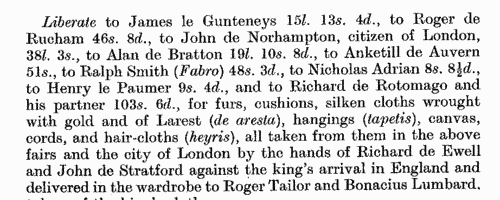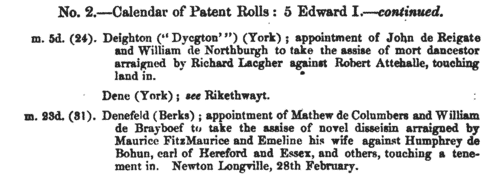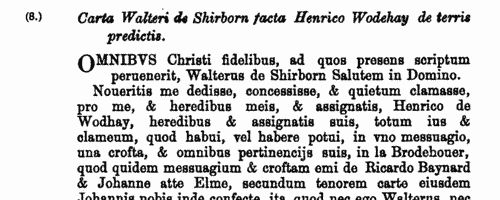Fuke Surname Ancestry ResultsOur indexes 1000-1999 include entries for the spelling 'fuke'. In the period you have requested, we have the following 19 records (displaying 1 to 10): Buy all | | | Get all 19 records to view, to save and print for £92.00 |
These sample scans are from the original record. You will get scans of the full pages or articles where the surname you searched for has been found. Your web browser may prevent the sample windows from opening; in this case please change your browser settings to allow pop-up windows from this site. Oblata or Fine Rolls
(1200-1216)
All the surviving oblata or fine rolls of the reign of king John were edited by Thomas Duffus Hardy and printed by the Commissioners of the Public Records in 1835. These are the oblata rolls of the 1st, 2nd and 3rd years of the reign, and the fine rolls of the 6th, 7th, 9th, 15th, 16th and 17th years. These rolls contain notices of the oblations or fines offered to the Crown to procure grants and confirmations of liberties and franchises of markets, fairs, parks and free warren; for exemption from tolls, pontage, passage and murage; to obtain justice and right; to stop, delay or expedite pleas, trials and judgments; and to remove suits and processes from inferior tribunals into the King's Court. Fines were also extracted for licence to trade, or permission to exercise commerce or industry of any kind, and to have the aid, protection, or goodwill of the King; to mitigate his anger or abate his displeasure; to be exempted from knighthood either for a term or for ever, and from attending the King in his foreign expeditions; they were also demanded for seisin or restitution of ancestral lands or chattels; for allowing delinquents to be replevied or bailed; for acquittal of murder; and for pardon of trespasses and misdemeanours; for the 'year and a day' of the lands and goods of felons and fugitives. Almost all entries have the county in question indicated in the left hand margin.FUKE. Cost: £4.00.  | Sample scan, click to enlarge

| Deeds from Bath in Somerset
(1240-1249)
More than 500 mediaeval deeds survived in the muniment chest of Bath in Somerset, almost all dealing with the transfers of small plots of land in the city. Each names the grantor and grantee, describes the land, and is witnessed by other citizens. This printed edition was prepared by the Reverend C. W. Shickle, Master of St John's Hospital in Bath. Where (as in many cases) the earliest deeds were undated, he was able to assign periods to each on the basis of style and content, particularly the names of witnesses. FUKE. Cost: £4.00.  | Sample scan, click to enlarge

| Liberate Rolls
(1251-1260)
These chancery liberate rolls of the 36th to 44th years of the reign of Henry III of England record the details of payments and allowances as part of the administration of government. Most entries start with the Latin words 'liberate', meaning 'deliver', or 'allocate', meaning allow. There are also 'contrabreves', warrants mainly to sheriffs of shires, assigning them tasks and allowing expenses. Most of the entries relate to England and Wales, but there are occasional references to Ireland and the English possessions in France.FUKE. Cost: £4.00.  | Sample scan, click to enlarge

| Fine Rolls
(1246-1272)
The fine rolls of the 31st to 57th years of the reign of king Henry III record part of the government administration in England. These excerpts from the rolls list in transcript applications by plaintiffs for various writs (such as 'ad terminum' and 'pone') and for assizes to be held by the justices in eyre to look into their grievances. A fine of half a mark (6s 8d) or a mark (13s 4d) was usually levied; the cases are normally identified by county, and record that the appropriate sheriff had been notified. There are also more extensive records, in which more detail is given. The excerpts were made by the Record Commission and printed in 1836.FUKE. Cost: £4.00.  | Sample scan, click to enlarge

| Patent Rolls: entries for Herefordshire
(1276-1277)
Calendars of the patent rolls of the reign of king Edward I are printed in the Calendars of State Papers: but these cover only a fraction of the material on the rolls. From 1881 to 1889 the reports of the Deputy Keeper of the Public Record Office also include calendars of other material from the rolls - about five times as many entries as in the State Papers - predominantly mandates to the royal justices to hold sessions of oyer and terminer to resolve cases arising locally; but also other general business. The calendar for the 5th year of king Edward I [20 November 1276 to 19 November 1277], hitherto unindexed, is covered here.FUKE. Cost: £6.00.  | Sample scan, click to enlarge

| Inhabitants of Leicester
(1103-1327)
The Corporation of Leicester commissioned the publication (in 1899) of extracts from the earliest borough archives, edited by Mary Bateson. This volume brings together several important sources: the borough charters; the merchant gild rolls (from 1196 onwards); tax returns; court rolls (from about 1260 onwards); mayoral accounts, &c. All the Latin and French texts are accompanied by English translations. Membership of the merchant gild was by right of inheritance (s. p. = sede patris, in his father's seat), or by payment of a fee called a 'bull' (taurus). The sample scan shows part of a gild entrance roll; those marked * paid their bull, and were thus, by implication, not natives, or at least not belonging to gild merchant families. By 1400 membership of the gild merchant had become the equivalent of gaining freedom of the borough (being a free burgess): but at this period the two were not necessarily the same, and some of the merchant gild members were not resident in the borough, merely traded there. Not all the tax rolls surviving for this period are printed: but full lists of names are given for a loan for redemption of pontage and gavelpence of 1252-3 (pp. 44-46); five tallages of 1269 to 1271 brought together in a single table (128-145); and tallages of 1286 (208-211), 1307 (255-257), 1311 (272-274) and 1318 (310-313). The portmanmoot (or portmote) was the borough court dealing with minor infractions and civil suits. Finally, there is a calendar of charters (from c.1232 onwards, 381-400), and a list of mayors, bailiffs (reeves), receivers and serjeants (401-407).
FUKE. Cost: £4.00.  | Sample scan, click to enlarge

| Clerks and Clergy in Herefordshire, Shropshire and Gloucestershire
(1361-1370)
The register of bishop Louis de Charltone of Hereford, containing general diocesan business, but also including ordination lists for monks and clergy. Only a small proportion of the clerks went on to acquire benefices and remained celibate. Hereford diocese covered almost all Herefordshire, southern rural Shropshire, a westward arm of Worcestershire, and a northwestern slice of Gloucestershire.FUKE. Cost: £6.00.  | Sample scan, click to enlarge

| Inhabitants of Yorkshire: Claro wapentake
(1379)
The poll tax returns for this wapentake, the area around Aldborough, Boroughbridge, Knaresborough and Wetherby.FUKE. Cost: £6.00.  | Sample scan, click to enlarge

| Clerks, clergy, benefactors and tenants of the Hospital of St Nicholas, Salisbury
(1214-1439)
Christopher Wordsworth, Master of the Hospital of St Nicholas in Salisbury, Wiltshire, published an edition of the 15th-century cartulary of that foundation in 1902. While transcribing the text, he interspersed it with notes and lists from his own researches so as to provide a general history of the hospital, and some of the material dates from much later than 1500, and relates to those institutions which he regarded as daughter institutions or offshoots of the hospital. There are later additions to the cartulary through to 1639, and records of the Chapel of St John Baptist on the Isle, the Scotist College of St Nicholas de Vaux (Valle Scholarium), and the collegiate church of St Edmund, Salisbury. There is also a calendar of records belonging to the hospital. The cartulary itself is a quarto codex of 80 leaves, copying charters of bequests to the hospital, and in these the main persons to appear are the benefactors, the witnesses, and occasionally the names of tenants, occupiers of adjoining tenements, and members of the hospital clergy. The cartulary is in six geographical sections: I, Box, Wyvelesford and Manningford Bohun; II, Broad Hinton; III, Fyssherton (Fisherton Aucher or Anger); IV, East and West Harnham; V, Salisbury; and VI, Gerardeston (Gurston in Broadchalke).FUKE. Cost: £4.00.  | Sample scan, click to enlarge

| Science Schools and Classes: Elementary Examination: Class Lists
(1869)
The Science and Art Department of the Committee of Council on Education published these class lists giving the names of all the successful candidates in the examination of science schools and classes taken in May 1869. The candidates were of three levels: honours; second stage or advanced examination; third stage or elementary examination. Twenty-three subjects were offered. These are the lists for the elementary examination. The tables, arranged subject by subject, give the candidate's full name (surname first), age, and occupation - or, in the case of those not yet of working age, father's occupation, preceded by (f.). Many candidates sat and were successful in more than one subject, and so appear in more than one list. The subjects are: I. Practical, Plane and Solid Geometry; II. Machine Construction; III. Building Construction; IV. Elementary Mathematics; V. Higher Mathematics; VI. Theoretical Mechanics; VII. Applied Mechanics; VIII. Acoustics, Light, and Heat: IX. Magnetism and Electricity; X. Inorganic Chemistry; XI. Organic Chemistry; XII. Geology; XIII. Mineralogy; XIV. Animal Physiology; XV. Zoology; XVI. Vegetable Anatomy and Physiology; XVII. Systematic and Economic Botany; XVIII. Mining; XIX. Metallurgy; XX. Navigation; XXI. Nautical Astronomy; XXII. Steam; XXIII. Physical Geography. FUKE. Cost: £6.00.  | Sample scan, click to enlarge

|
| 1 | 2 |  |
Research your ancestry, family history, genealogy and one-name study by direct access to original records and archives indexed by surname.
|












